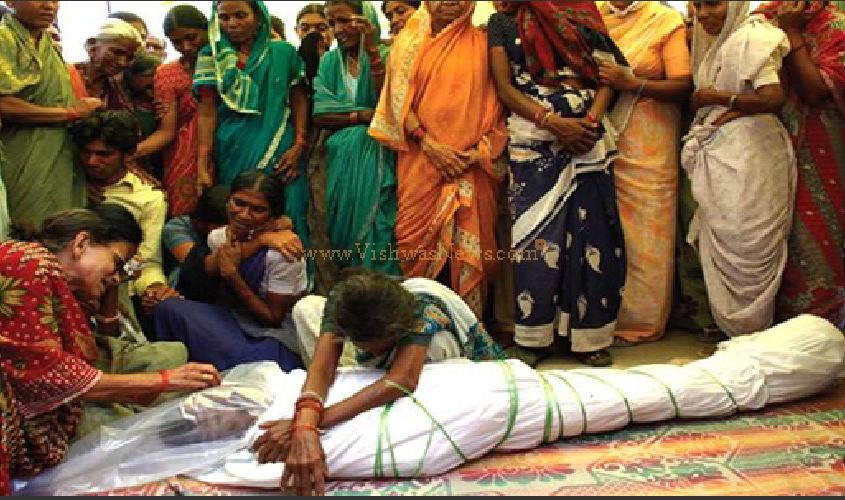The investment subsidy scheme, ‘Rythu Bandhu’, is aimed at helping only land owning farmers, found a study conducted by Tata Institute of Social Sciences.
Even after the implementation of an investment subsidy scheme by Telangana’s TRS government which doles out Rs 8,000 per acre a year, the burning problem of farmers’ suicides might remain unsolved, according to a latest survey done by the Tata Institute of Social Sciences (TISS), Mumbai. The investment subsidy scheme, called “Rythu Bandhu”, is aimed at helping only the farmers who own lands in their name.
The study finds that a majority of those who have taken the extreme step of ending their lives over the years are tenant farmers and are not eligible to get this investment subsidy. They do not benefit from the government’s largesse. Chief Minister K. Chandrasekhar Rao (KCR) highlighted his Rythu Bandhu scheme at the recent Niti Aayog Governing Council meeting as a step to solve agrarian crisis.
Telangana, along with Andhra Pradesh and Maharashtra, accounts for a large number of suicides by farmers and a host of schemes and sops have been given to end these tragic deaths. KCR’s investment subsidy scheme, at the rate of Rs 4,000 per acre per crop, is billed as a giant step to solve the issue of farmers’ suicides as this money is not repayable.
At the instance of the Prime Minister’s Office, the Union Agriculture Ministry has called the officials of the Telangana agriculture department to know more about the scheme. The Centre has been examining whether this scheme can be implemented all over the country. At the same time, several
The KCR government has rolled out the Rythu Bandhu scheme in Telangana from first week of May and around 46 lakh farmers have received a cash subsidy of Rs 4,000 per acre for the Khariff season that is spread over July to September. Another Rs 4,000 per acre subsidy would be distributed for Rabi crop from the first week of October.
The TISS study that covered a period of mid-May to mid-June has found that the implementation of Rythu Bandhu may be a boon to farmers who own land, but not to tenants who cultivate land on annual leases. A majority of the farmers who had committed suicide were either landless tenants or small and marginal landholders. V. Ravi, an office bearer of Rythu Swarajya Vedika which is also associated with the TISS in conducting the survey in 31 districts of Telangana told The Sunday Guardian that the “doling out of around Rs 13,000 crore in the name of Rythu Bandhu might not solve the burning issue of farmers’ suicide”. “Unless the scheme covers all tenants, farmers’ suicide will remain a burning problem,” he said.
A team of experts from TISS have studied 692 cases of farmers’ suicide that took place between May 2014 and May 2018 in Telangana. It found that 520 of them, around 75%, were tenant farmers who owned nothing or had small landholdings of less than an acre or two. These tenants have no protection, no rights and no support from the bankers.
They had to commit suicide as they depended on private moneylenders who charge up to 24% interest on the principal amounts ranging from Rs 2 lakh to Rs 3 lakh, mostly for raising commercial crops of cotton and chilli. Of the 620 farmers who committed suicide, 18% were completely landless, while 46% were small and marginal landholders. Nalgonda, Warangal, Adilabad, Medak and Mahabubnagar districts account for a majority of suicides as farmers here depend on bore-wells for irrigation. Farmers who ended their lives had borrowed, on an average, around Rs 4 lakh over a period of two to three years, the TISS study found.
Ravi explained that the farmers who had received governmental subsidy of Rs 4,000 per acre were not willing to pass on or share the money with tenants who are actually cultivating the lands.
The Chief Minister had made it clear that the scheme had nothing to do with the rights of tenants and the land owners had to decide on passing the benefit to cultivators. Though a small portion of 12% farmers own land holdings bigger than 20 acres, they, in fact, had received 25% of the total Rs 6,500 crore distributed as subsidy in the first phase.
Telangana agriculture principal secretary C. Parthasarthi told this newspaper that the government was trying to arrange enough credit flow this Kharif season from the bankers. He said that the agriculture department was studying the report of TISS and was in touch with the Centre on the same.
But agriculture activists like K. Sajaya, of Caring Citizens Collective, which works for the families of farmers who committed suicide, said that the Rythu Bandhu scheme has failed to find a solution to the tragic deaths in Telangana.

